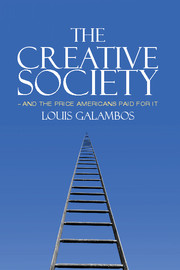Book contents
- Frontmatter
- Contents
- Preface
- 1 1931
- 2 Life, Death, and Learning in the Cities
- 3 Toward a New Economy, 1890 to 1930
- 4 State Crafting – American Style
- 5 Confronting the World
- 6 Winners and Losers, 1890 to 1930
- 7 New Deal Experiments
- 8 Fighting On God’s Side
- 9 The New Aristocracy, 1946 to 1969
- 10 The Suburban Conquest of the 1960s
- 11 Empire in the American Century
- 12 The Tattered Empire of the 1970s
- 13 The Cracked Core
- 14 The American Solution, 1981 to 2001
- 15 Conservatism: Rhetoric and Realities, 1981 to 2001
- 16 The Hegemony Trap
- 17 The American Dream, 1981 to 2001
- 18 The Creative Society in Danger
- Acknowledgments
- Index
- References
7 - New Deal Experiments
Published online by Cambridge University Press: 05 June 2012
- Frontmatter
- Contents
- Preface
- 1 1931
- 2 Life, Death, and Learning in the Cities
- 3 Toward a New Economy, 1890 to 1930
- 4 State Crafting – American Style
- 5 Confronting the World
- 6 Winners and Losers, 1890 to 1930
- 7 New Deal Experiments
- 8 Fighting On God’s Side
- 9 The New Aristocracy, 1946 to 1969
- 10 The Suburban Conquest of the 1960s
- 11 Empire in the American Century
- 12 The Tattered Empire of the 1970s
- 13 The Cracked Core
- 14 The American Solution, 1981 to 2001
- 15 Conservatism: Rhetoric and Realities, 1981 to 2001
- 16 The Hegemony Trap
- 17 The American Dream, 1981 to 2001
- 18 The Creative Society in Danger
- Acknowledgments
- Index
- References
Summary
In the 1930s, there were a few winners, but most of the people were losers in small towns like Fostoria, Ohio, and Princeton, Indiana. It seemed the depression would never end. Princeton, which was a slightly smaller version of Fostoria, was nestled in the southwest corner of Indiana, about 11 miles from the Wabash River to the west and 25 miles from the Ohio River to the south. Princeton's fortunes turned on agriculture, on coal, and on the railroad, its commercial lifeline. The Southern Railroad Company had a big repair shop on the edge of town, and the Deep Vein Coal Mine, just a few miles to the south, used the Southern to ship its soft coal. Out near the mine was the headquarters for a large commercial agribusiness that sprawled over 12,000 acres of rich farmland. The investors who owned the coal mine had amassed the land to control the mineral rights. A few years later, under the watchful eye of Orville “Reddie” Redenbacher, they built up a substantial operation in hybrid corn and then in popcorn. But that enterprise was just getting underway in the late 1930s, and meanwhile, the only other business of note was a Heinz plant. We didn't know much about it, but we were told they made catsup.
Because Princeton was the seat of Gibson County's government, there was a red-brick courthouse in the middle of a square that was the center of the town's dwindling retail life. Like most other small towns in the heartland, it had a Penny's Store, a pool room that kept the men off the streets, and a candy and soda shop know universally as “Greeks” in “honor” of the family that ran the establishment. When teenage boys left the Palace Pool Parlor, they’d stroll over to Greeks to meet their girlfriends. All of these institutions played central roles in the lives of young people growing up in Princeton, Indiana, in the 1930s.
- Type
- Chapter
- Information
- The Creative Society – and the Price Americans Paid for It , pp. 94 - 112Publisher: Cambridge University PressPrint publication year: 2011



